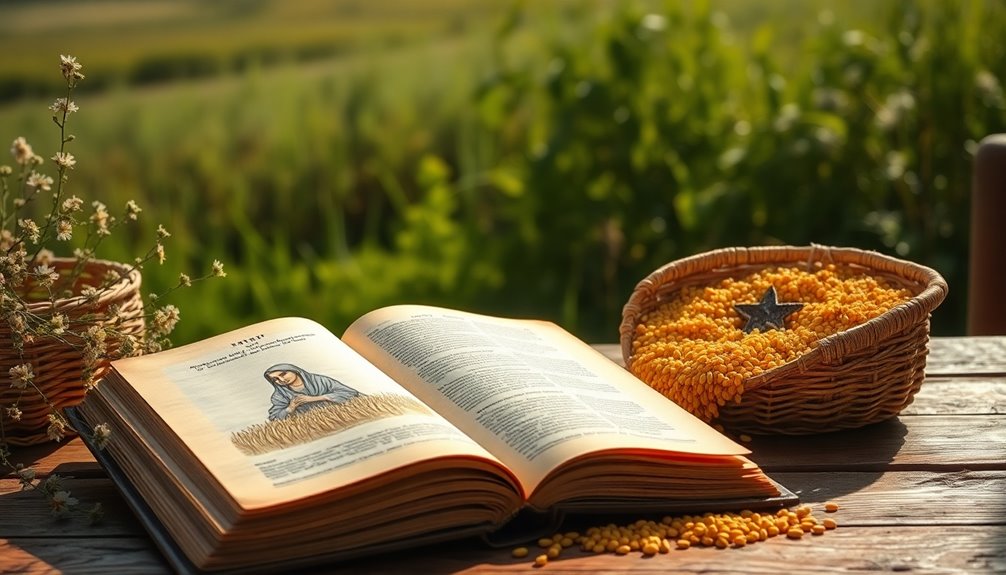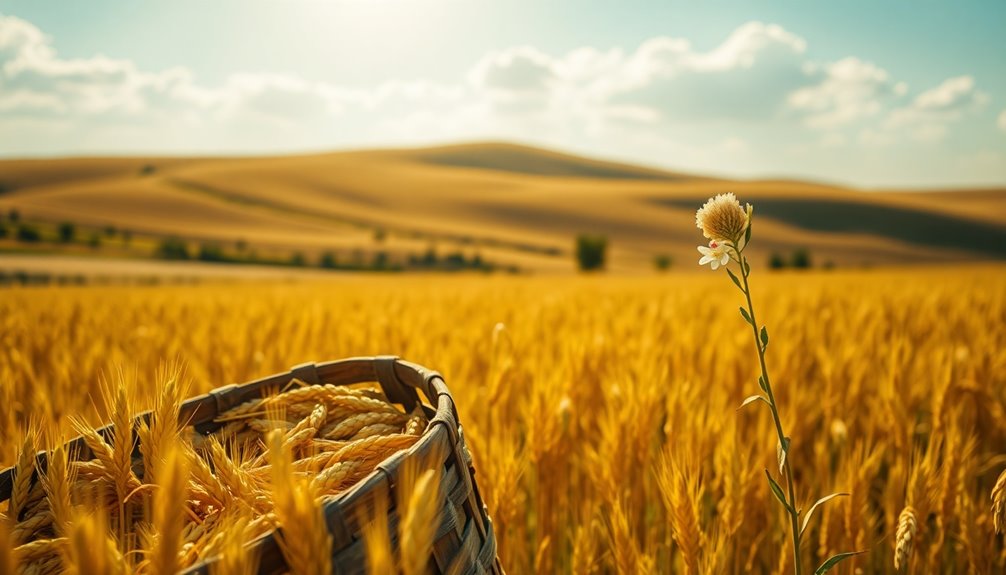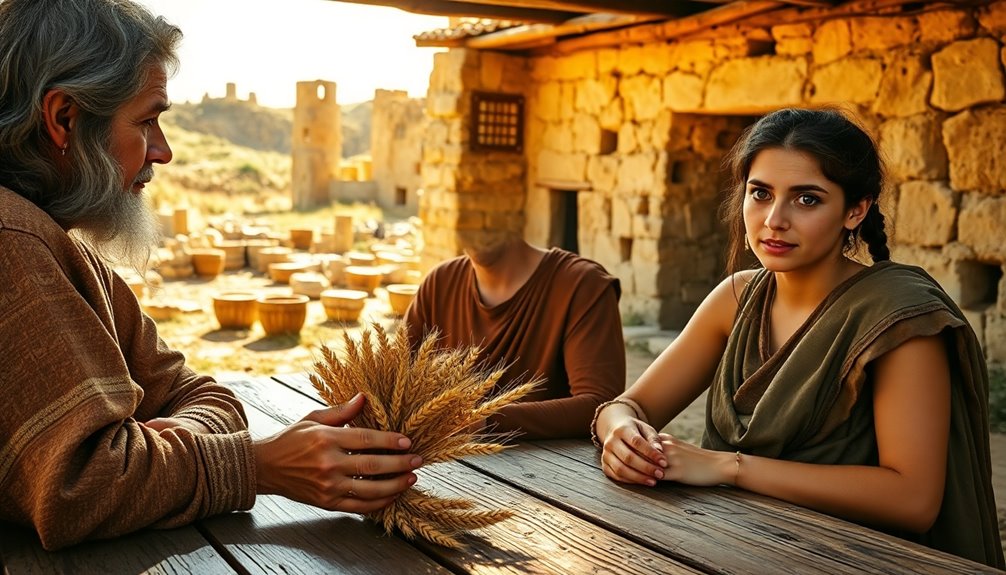The Book of Ruth is a compelling narrative about loyalty and redemption during a tumultuous time in ancient Israel. It follows Ruth, a Moabite, who remains devoted to her mother-in-law, Naomi, after their husbands die. Ruth's determination leads her to glean in the fields of Boaz, who eventually marries her as a kinsman-redeemer, ensuring family continuity. Their story emphasizes the importance of community support and selfless love, highlighting Ruth's moral strength. This tale not only underscores deep familial bonds but also sets the stage for the lineage of King David. Explore this rich narrative further for deeper insights.
Key Takeaways
- The Book of Ruth is set during the tumultuous period of the Judges, focusing on themes of loyalty and redemption amid societal challenges.
- Ruth, a Moabite widow, chooses to stay with her mother-in-law Naomi, demonstrating profound loyalty and love.
- Ruth gleans in the fields of Boaz, a kinsman-redeemer, highlighting community support and the importance of familial loyalty in ancient Israel.
- Her marriage to Boaz symbolizes inclusion in the Israelite community and contributes to the lineage of King David, emphasizing the impact of loyalty.
- The story of Ruth is celebrated during the Jewish festival of Shavuot, reflecting its themes of devotion, resilience, and divine providence.
Introduction

The Book of Ruth, set against the backdrop of the tumultuous period of the Judges, offers a poignant exploration of loyalty and redemption. In this compelling narrative, you'll discover the unwavering loyalty of Ruth, a Moabite woman who chooses to stay with her Israelite mother-in-law, Naomi, after the tragic loss of their husbands. This choice isn't just a personal commitment; it reflects the cultural importance of familial loyalty in ancient society.
As you delve into the story of Ruth, you'll witness her determination to support Naomi, even in their dire circumstances. Ruth's dedication leads her to glean in the fields of Boaz, a relative of Naomi, marking a pivotal moment in their lives.
Boaz's kindness and willingness to protect Ruth and Naomi demonstrate the themes of redemption and community support during challenging times. Ultimately, the narrative transitions from the chaotic era of the Judges to the establishment of the Davidic line, showcasing how Ruth's loyalty to Naomi not only influences her life but also has lasting implications for future generations.
Through Ruth's journey, you'll see how loyalty can lead to profound transformation and hope.
Key Verses From Ruth

When you look at the key verses in Ruth, you'll notice how they highlight the themes of loyalty and divine providence.
For instance, Ruth's declaration of commitment in Ruth 1:16 and her bold request for redemption in Ruth 3:9 are pivotal moments in the story.
These verses not only shape her identity but also connect her to God's greater plan through her lineage to David in Ruth 4:17.
Primary Bible References
Key verses from the Book of Ruth reveal profound themes of loyalty, kindness, and redemption. In Ruth 1:16, Ruth's unwavering commitment shines through as she declares to Naomi, "Where you go, I'll go, and where you stay, I'll stay." This powerful statement underscores her loyalty, even in the face of loss.
Later, in Ruth 2:12, Boaz recognizes Ruth's kindness toward Naomi, blessing her with, "May the Lord repay you for what you have done," showcasing the importance of love and loyalty.
Ruth's humility is evident in Ruth 3:9 when she identifies herself as "your servant Ruth," seeking redemption from Boaz. This moment emphasizes her desire for security and a new beginning.
The birth of Obed, mentioned in Ruth 4:17, marks a significant turning point, with townspeople celebrating, "A son has been born to Naomi." This moment illustrates the restoration of family lineage through Ruth's marriage to Boaz.
Finally, Ruth 4:22 connects Obed to King David, highlighting Ruth's crucial role in the genealogy leading to one of Israel's greatest kings and the messianic line.
Secondary Bible References
Several verses in the Book of Ruth highlight profound themes that resonate throughout the narrative. One of the most impactful moments occurs in Ruth 1:16, where Ruth expresses her unwavering loyalty to Naomi, stating, "Where you go, I'll go; where you stay, I'll stay; your people will be my people, and your God my God." This declaration sets the tone for her commitment to both Naomi and the God of Israel.
As the story unfolds, in Ruth 2:12, Boaz recognizes Ruth's kindness and loyalty, blessing her with, "May the Lord repay you for what you have done." This reflects God's providential care over Ruth as she seeks refuge under His wings.
In Ruth 3:9, Ruth boldly asks Boaz for redemption, identifying herself and appealing to him as a guardian-redeemer of their family property.
Finally, Ruth 4:17 celebrates the birth of Obed, emphasizing the significance of redemption and family lineage.
These key verses encapsulate the themes of loyalty, redemption, and divine providence, illustrating how Ruth's choices profoundly impacted the lineage of David.
Ancient Israelite Family Dynamics

Family loyalty stood at the heart of ancient Israelite society, shaping relationships and guiding actions. You see this vividly in the story of Ruth and Naomi, where Ruth's unwavering commitment to her mother-in-law after the death of their husbands highlights the importance of familial bonds.
Widows like Naomi and Ruth faced immense societal challenges, often relying on the kindness of family members and the community. Ruth's gleaning in the fields of Boaz illustrates this reliance on familial support.
The concept of a kinsman-redeemer was crucial in these family dynamics, as it ensured that a close relative would take responsibility for supporting the family of a deceased relative. Boaz's marriage to Ruth exemplifies this role, showcasing how loyalty can preserve family lines.
Moreover, Ruth's inclusion as a foreign woman into the Israelite family challenges the norms of the time, demonstrating that loyalty and virtue can transcend ethnic boundaries.
The narrative emphasizes women's vital role in maintaining family integrity, with Ruth ultimately becoming the great-grandmother of King David, a significant figure in Israelite history, further underlining the power of loyalty in shaping family legacies.
Cultural Significance of Loyalty

Emphasizing loyalty, the story of Ruth profoundly illustrates its cultural significance in ancient Israelite society. Ruth's unwavering loyalty to Naomi, demonstrated in her powerful declaration, "Where you go, I'll go," highlights the cultural value placed on familial devotion and commitment. This loyalty extends beyond personal relationships; it reinforces the societal structures that bind communities together.
Ruth's actions not only exemplify selflessness and sacrifice but also serve as a model for true love, which often demands personal sacrifice for the sake of others. Her steadfast commitment leads to her inclusion in the Israelite lineage, showcasing how loyalty can transcend cultural and ethnic boundaries. As a Moabite, Ruth becomes an integral part of the Israelite community and the genealogy of King David, demonstrating that loyalty can foster unity and connection.
The narrative also reveals how Ruth's loyalty is rewarded with divine providence. Her dedication results in her marriage to Boaz, signifying that acts of kindness and loyalty can yield significant blessings and transformation in one's life.
Ultimately, the story of Ruth is a poignant reminder of the enduring power and importance of loyalty within both personal and communal contexts.
Misunderstandings About Ruth's Loyalty

When you think about Ruth's loyalty, it's easy to mistake it for mere obligation, but that couldn't be further from the truth.
Her commitment to Naomi was fueled by genuine love and a courageous choice to embrace a new culture.
Let's unpack these misconceptions and explore the real depth of Ruth's loyalty.
Debunk Loyalty Misconceptions
Many people misunderstand Ruth's loyalty, mistaking it for simple obedience or cultural obligation. In reality, Ruth's loyalty is a powerful expression of true loyalty, driven by her emotional attachment to Naomi. When she declares, "Where you go, I'll go," she's making a personal choice that reflects her deep commitment, not just to Naomi as family but to her as a person.
This decision goes beyond mere survival; it showcases a profound bond that prioritizes love and sacrifice. Ruth willingly embraces an uncertain future in a foreign land, choosing to identify with Naomi's people and God. Her actions reveal that true loyalty can extend beyond biological relationships to encompass faith and community, emphasizing the strength of her character.
Moreover, Ruth's loyalty isn't a passive acceptance of her circumstances. Instead, it's an active pursuit of a new life, as she works diligently in Boaz's fields to support both herself and Naomi.
Cultural Context Misinterpretations
Understanding Ruth's loyalty requires a closer look at the cultural context of her time, which often gets overlooked. When you read her declaration, "Where you go, I'll go" (Ruth 1:16), it's easy to misinterpret this as mere obligation. However, this is a profound act of love that defies the cultural norms of ancient Israel.
In a society that emphasized familial loyalty, Ruth's choice as a Moabite woman to accompany her widowed mother-in-law, Naomi, is radical. She challenges societal perceptions of foreigners and embraces Naomi's identity, demonstrating both moral strength and deep devotion.
Additionally, Ruth's actions reflect the relationship dynamics between her and Naomi, which are sometimes overshadowed by her eventual marriage to Boaz. By focusing solely on Ruth's later life, you risk missing the sacrifices she made in a patriarchal society to provide for Naomi.
Her loyalty isn't just a personal commitment; it's a courageous and selfless act that highlights the complexities of love, identity, and societal expectations. Recognizing this context enriches your understanding of Ruth's character and the significance of her journey.
Community Support Initiatives

In the Book of Ruth, you see how loyalty in friendships can strengthen community bonds.
Ruth's commitment to Naomi not only showcases the power of support but also illustrates how individuals can uplift one another during tough times.
Ruth's Loyalty in Friendships
Ruth's loyalty serves as a powerful example of how deep friendships can thrive in the face of adversity. Her unwavering commitment to Naomi, illustrated by her declaration, "Where you go, I'll go," highlights the profound loyalty that defines true friendship.
After losing their husbands, Ruth chose to accompany Naomi back to Bethlehem, demonstrating that community and familial loyalty are vital during tough times.
By gleaning in Boaz's fields, Ruth not only provided for herself and Naomi but also showcased the importance of support systems in overcoming hardship. Her willingness to sacrifice her own comfort for Naomi's well-being emphasizes that genuine friendship often requires selflessness and devotion.
Ruth's actions transformed their lives, securing a hopeful future for both women. Through her loyalty and kindness, she became part of the lineage of David, illustrating how supportive relationships can lead to remarkable outcomes within a community.
In challenging moments, Ruth's story reminds us of the strength found in loyalty and the impact of unwavering commitment in friendships. Your own relationships can flourish by embodying the same spirit of sacrifice and support that Ruth exemplified. Furthermore, the bonds formed in adversity can lead to a profound legacy, much like the enduring love that mothers share with their children.
Building Stronger Community Bonds
Community bonds thrive when individuals come together to support one another, just as Naomi and Ruth did in their time of need. Their story showcases the power of community support, highlighting how kinship and loyalty can create transformative relationships.
When Ruth gleaned in Boaz's fields, she engaged in an essential practice that allowed the marginalized to benefit from the land's bounty, reinforcing a culture of assistance.
Boaz's role as a kinsman-redeemer demonstrates how one person's willingness to act can ensure the well-being of others. His generosity not only provided for Ruth and Naomi but also strengthened the fabric of their community.
This narrative serves as a reminder that each act of kindness, no matter how small, contributes to building stronger connections. Financial stability can also enhance community support by empowering individuals to give back.
As you cultivate loyalty in your relationships, remember that your actions can empower those around you. Just as Ruth transitioned from a foreign widow to a valued member of the Israelite community, your commitment to support others can spark meaningful transformations.
Ruth's Legacy of Faithfulness

Demonstrating unwavering loyalty, Ruth stands out as a beacon of faithfulness in her commitment to Naomi. Her famous declaration, "Where you go, I'll go," isn't just words; it embodies her deep-rooted dedication to family and faith.
Despite being a Moabite widow, Ruth doesn't shy away from hard work. As she gleans in the fields of Boaz, her resilience shines through, showcasing her determination to provide for Naomi.
Boaz recognizes Ruth's virtue, leading to their marriage, which symbolizes her inclusion in the Israelite community. This union isn't merely personal; it's part of a divine redemptive plan. From this marriage, Ruth gives birth to Obed, who becomes the grandfather of King David.
Thus, Ruth's legacy extends beyond her lifetime, placing her firmly in the lineage of the Davidic line.
Ruth's story illustrates how acts of loyalty and kindness can create a ripple effect of blessings within God's family. Through her faithfulness, she not only transforms her own life but also lays the groundwork for future generations, reminding us of the profound impact one person's loyalty can have in the grand narrative of faith. Her journey also highlights the importance of establishing healthy boundaries, ensuring that relationships thrive through respect and mutual understanding.
Additional Resources

For those looking to explore Ruth's inspiring story further, a wealth of resources is available. The Book of Ruth, celebrated during the Jewish festival of Shavuot, highlights themes of loyalty and redemption, particularly through its portrayal of women.
You can dive deeper into these themes by accessing various commentaries and studies that examine Ruth's significance in the biblical narrative. Online platforms like BibleGateway and Blue Letter Bible offer different translations of Ruth, along with insightful commentaries and study guides that help contextualize her story.
If you're a visual learner, check out educational videos and lectures on YouTube, where experts analyze Ruth's cultural and historical background.
Additionally, numerous artistic adaptations inspired by Ruth's devotion can enrich your understanding of her legacy. From paintings to literature, these works reflect the profound impact of her lineage, which ultimately leads to King David.
Frequently Asked Questions
What Is the Main Point of the Book of Ruth?
The main point of the Book of Ruth is about loyalty and commitment.
You see how Ruth's dedication to Naomi, even after losing her husband, showcases the strength of love and sacrifice. It emphasizes God's providence, illustrating how Ruth's choices lead to blessings, including her marriage to Boaz.
Through acts of kindness and inclusion, the story reveals that selfless love can yield significant rewards and divine favor in your life.
What Are the Moral Lessons of the Story of Ruth?
The moral lessons of the story of Ruth emphasize loyalty, kindness, and community.
You see how Ruth's commitment to Naomi showcases unwavering support, even in tough times.
Boaz's generosity highlights the importance of helping others, while Ruth's hard work illustrates the value of diligence for the greater good.
Ultimately, the tale also reminds you of divine providence, showing how your actions can lead to unexpected blessings and fulfillment of a greater purpose.
What Are Three Key Events Found in the Book of Ruth?
In the story, you'll find three key events that shape the narrative.
First, Ruth pledges loyalty to Naomi, showcasing her commitment.
Next, Ruth gleans in Boaz's fields, where her hard work earns her favor.
Finally, Naomi devises a plan for Ruth to approach Boaz, leading to their marriage and the redemption of Ruth's family line.
These events highlight themes of loyalty, hard work, and divine providence in shaping lives.
What Is the Brief Story of Ruth?
You meet Ruth, a determined Moabite widow, who chooses to stay loyal to her Israelite mother-in-law, Naomi.
Together, they return to Bethlehem, where Ruth gleans in the fields of Boaz, a kind relative.
Boaz notices Ruth's dedication, and Naomi encourages her to seek his protection.
After a pivotal midnight encounter, Boaz agrees to marry Ruth, leading to the birth of their son Obed, who's connected to the lineage of King David.










